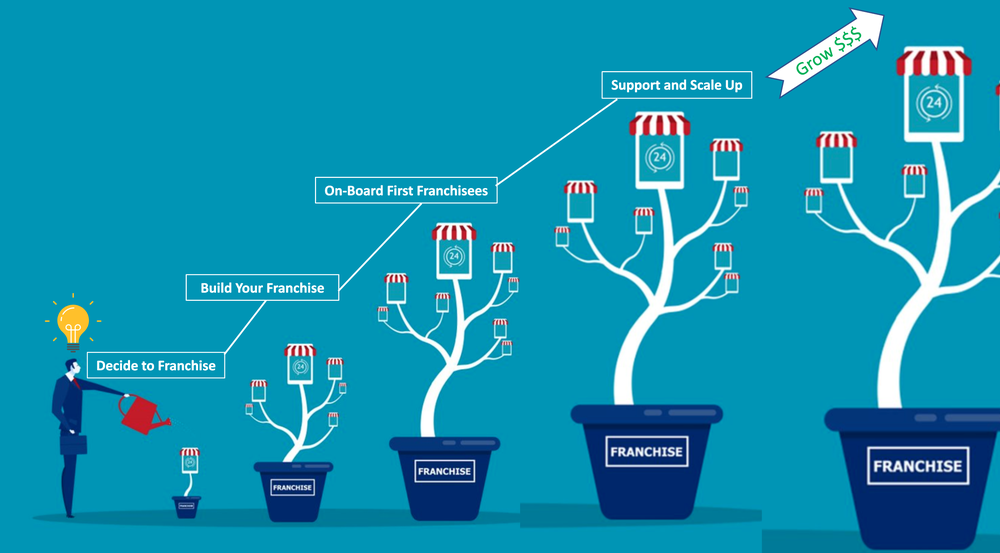You may have heard that fear of the unknown is one of the most common reasons people never get started on their dreams. This is very true in the business world. Countless people have wished they could expand their business or brand across the country or around the world but never even try.
In my own experience, many people have asked me what it really looks and feels like to go through the franchising process — what is the impact on the schedule and the business? How will the employees and customers respond?
That’s why I’m excited for this four-part series, “Franchising Your Business.” I decided that getting a bird’s eye view of what it looks and feels like to go through the franchising process may remove some of the stumbling blocks to allow great business models to move forward and become the franchise success stories of tomorrow.
As for whether any business can be franchised, my standard answer is, “If it’s legal, moral, ethical and makes money, it can most likely be franchised.” Of course, there are other criteria, but some people think that their business isn’t good enough or different enough or is lacking the “secret sauce” to become a franchise system. The truth of the matter is this: Your business may have what it takes to become the next major brand.
Back in the good old days, a business needed a huge budget to franchise just to keep up with the marketing budgets of other big brands. Media placements were far more expensive and limited in reach, so they had to be duplicated in each market. Television, radio and newspapers were the primary options, and it was tough to break into the industry for smaller concepts.
Now that digital marketing and other technologies have entered the picture, newer and younger concepts can enter the marketplace with a much smaller marketing budget and targeted campaigns yielding better return on investment. Your business has just as much potential as any of the larger brands of today. They all had to start on the same road and onboard their first franchise owner just like you will do.
For this series, I will focus on the four primary phases of any standard franchising process:
- The Decision to Franchise
- Building Your Franchise Opportunity
- Onboarding Your First Franchisees (Early Adopters)
- Supporting, Scaling and Growth

We will be following one of my clients who’s moving through these phases so you can get the insiders experience from someone that’s doing it. We will also have a corresponding podcast for each phase so you can hear from him as well.
Introducing Mike Hutzel, founder and CEO of EagleONE. Hutzel has built an amazing business over the years that offers small, mid-sized and Fortune 500 clients and government agencies marketing, customer experience and call center support. He is now franchising his business model so he can align with operators in other markets.
One of the best aspects of the franchising model is the fact that it enables a great business model to grow in new markets. It puts “boots on the ground” to represent the brand like no other business model. And we begin with making the decision to franchise your business. When I asked Hutzel about taking that leap, he pointed out that their business was growing during the pandemic and they saw many recently unemployed people looking for their next career opportunity. The EagleONE recession/pandemic-resistant model is a perfect solution, so they decided now was the time to expand.
One of the important factors when making the decision to franchise EagleONE was to fully evaluate both sides of the opportunity first. It was very important to Hutzel and his team to create a win-win opportunity. They wanted to be sure that if people are going to invest in an EagleONE franchise, that they’re arming franchise owners with everything they need to succeed.
I pointed out the fact that starting a franchise is starting a whole new business. I asked him to tell us about the benefits of franchising that struck him and his team that made him want to start a whole new franchise business. His team learned that they had to look in the mirror and reflect and get enlightened for each person’s role, building even more camaraderie. These benefits made them stronger as they get ready to train and support their franchisees.
Hutzel also commented that he involved his family in his decision to franchise. This is a critical step. Franchising a business is a big commitment, and everyone needs to be on board and know the impact of the new venture on them, including both the extra hard work andlong-term benefits. This led Hutzel to make a fully balanced decision.
His gold nugget of advice to share with others considering franchising was to commit to win no matter what. The work is challenging at times, but they made the decision to burn the bridges and win and never give up. So when things get tough, lean on your family and your team, rally the troops and keep marching on.
The post Franchising Your Business, Part 1: Making the Decision to Franchise appeared first on Entrepreneur
Original source: Entrepreneur






